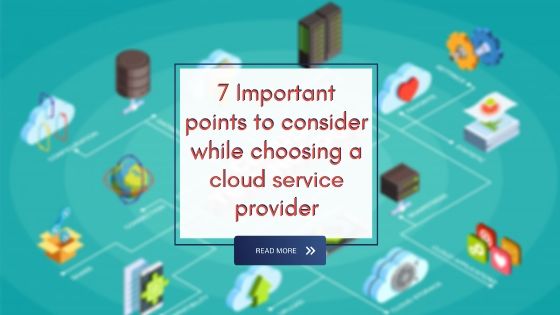
7 Important points to consider while choosing a cloud service provider
Cloud platforms have become the reality for small and big business, with the development of cloud technology in recent years. The cloud is continuously increasing and its demand is growing, according to IDC. The cloud has to overhaul traditional on-premise technology, and has a long way to go, according to Forrester’s latest reports.
Selecting the right service provider has become a challenging task with multiple cloud service providers delivering various levels of support and management. As the cloud marketplace is widening with new options of deployment, when choosing a cloud enterprise software platform, businesses must take into account the different aspects associated with their success.
Along with the level of functionality required to accomplish the business goal, the service provider should have the sort of deployment that suits business IT infrastructure. First, businesses need to determine what level and sort of cloud services they want, and whether to go with a public cloud or private cloud service.
Like with any software choice, criteria such as suitable, ROI, and risks must be taken into account before choosing the right vendor.
Proper Services
Before choosing to migrate your entire business to the cloud, make sure the service provider’s solution accommodates to your current environment and includes technology that supports your cloud expectations.
Likewise, the specifications, architectures, and services of the provider should go with the workloads and objectives of your management. Businesses must verify the scope of their customization so that their infrastructure can adjust with their service providers’ platform.
Go for a service provider that provides comprehensive migration services and full support during phases of assessment and planning. The service provider’s technical teams often support to help the company effectively move into the cloud.
Several large-scale public cloud providers offer some assistance so you might need help from third parties to assist your team understand what the cloud is and how to automate the operations with the cloud.
Reliable
No doubt all cloud providers will claim to be safe and reliable. But a cloud client can not only depend on the quality of infrastructure without the third party certificate verification.
A secure cloud provider for the data center as per industry standard should have the certification and audit evidence.
Always opt for service from a reliable and secure network that has the certified infrastructure.
Suitable for Existing Infrastructure
Will new technology systems fit with existing solutions? A question that brings stress to C-suite executives and IT executives who have to make Cloud technology implementation? It would be a great strategy to track whether an organization’s current infrastructure could be supported by the offered technology.
Further, to improve the compatibility, the service provider must support multiple computer languages and databases. To prevent lock-in from vendors and confusions of selecting from various platforms, it can be a smarter move to choose an infrastructure where you can adjust workloads according to your needs.
Disaster Restoration
Cloud disaster recovery is a backup plan that involves storing and managing electronic data records as per security concerns in a cloud environment. The cloud DR ensures data recovery or failover implementation if any disaster occurs. Businesses could draw up a strategy for their next data storage system and thus reduce downtime.
Options For Cloud Deployment
The main four options for cloud deployment are:
Public Cloud
This computing model core is standard, and the cloud solution provider makes storage is provided to the common public.
Private Cloud
This option of cloud environment is only for business use as with the assistant of an organization’s firewall the cloud provider gives computing proficiency.
Virtual Private Cloud
To ensure high data security, it facilitates a multi-tenants cloud-hosting environment.
Hybrid Cloud Model
This option model uses on-premise platforms.
Choosing the best cloud service provider so that your business can make the most of it and achieve the goals.
Network Control
The cloud provider needs a robust, efficient, and scalable network to provide reliable network connectivity to the customers. Your cloud provider should be able to address the unpredictable complexities of cloud services and take full control of the infrastructure.
Pricing
Pricing is the essential key for companies looking to implement cloud backup as they need to balance service costs with different service levels.
Therefore, businesses must analyze pricing models before choosing the best cloud service provider. Various backup providers give value-added and quality-oriented services with a flexible pricing scheme that suits the business model.
The usual business models for cloud backup billing are how much data is stored after de-duplication and compression, and how much is assigned for cloud backup. You need to check that the service provider covers charges for uploading, downloading, setup fees, and restoring the couriered disk, as this may result in unexpected expenses.
For any query about Tally on cloud services visit Tally-on-cloud.com.
Read other related blogs:
–Top 3 benefits of cloud technology for businesses of all sizes
–Top 10 Reasons Why Cloud Adoption Is Necessary For Small Businesses

